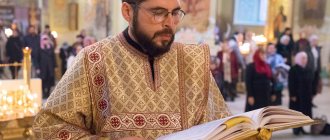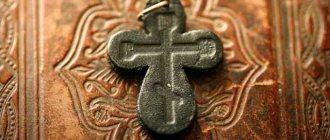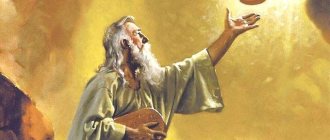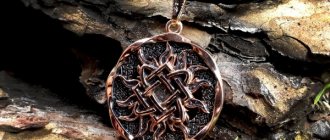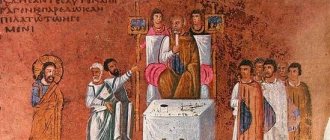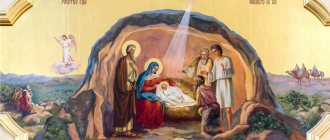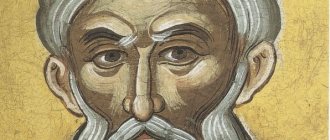When and where did kutia appear in Russia?
In Orthodoxy, kolivo did not appear immediately. Its homeland is Greece, which found meaning in every object.
Initially, this dish was prepared as a funeral dish in countries where there is a cult of worship of the dead.
Christianity arose when the world lived according to pagan laws. Many rituals of that time have taken root to this day, only their meaning has changed.
In Russia, kolivo has become a symbol of life and wealth; it is used for weddings and children’s baptisms.
Boiled wheat seasoned with poppy seeds and honey was called kutia in Greece.
How is it connected with the birth of the God of gods, the King of kings, the Savior of mankind?
Just as Jesus gave people eternal life through faith in Him after renouncing the sins of this world, so the grain is a symbol of fertility, which, dying in the spring, gives life to many ears of corn.
A person who eats kolivo symbolically joins the eternal cycle of life, being reborn through faith in Jesus
- The blessing of eternal life, a sweet stay in paradise, is associated with honey.
- Poppy - symbolizes prosperity and fertility, tranquility and many bounties.
Every housewife tries to prepare the richest and most satisfying kutya on holidays in order to attract wealth and prosperity to the house.
Orthodox Life
Priest Andrei Chizhenko answers.
We entered Lent through Adam's exile, for we are his children, offspring from the root of Adam and Eve. And we have a terrible inheritance within us: sin is like a disease, a fatal disease that affects every cell of our being - a disease that can only be healed by Christ. Therefore, imitating their, albeit sinful, but still holy ancestor, they left the bright paradise into the darkness of exile, into the darkness of earthly pilgrimage. After all, even the clothes and coverings of our churches are dressed in black, and the vestments of the clergy too.
But, strangely enough, this darkness turned out to be not hellish eternal darkness. There is something providential about us in it - a kind of saving Divine grace. After all, the Lord continues to embrace both this darkness of the fall of man and the world perverted by it, like a bird hugs its beloved chicks. This is not the heavy darkness of despondency and doom of the ancient Greek pagan fate. In this darkness God breathes - Living and Existing. This is the darkness before the dawn of salvation. In this specific case of our fast - before the Resurrection of Christ. But we must go out to fight our old man, our passions and lusts. Enter this darkness of struggle! In this darkness of illness and healing (oh, so painful!) from it.
We must enter the darkness of Great Lent, not of God's abandonment, but of God's presence, for this is all providentially about us. And in this almost Old Testament darkness, star maps of salvation are scattered for us so that we do not go astray. Just as the holy judges and prophets were given to the people of Israel, like some kind of god-voiced ringing trumpets, announcing the coming Messiah, so in the darkness of Great Lent we were given a cartography of salvation, a shining star map through the Holy Pentecost, leading us in the right direction - to Bright Easter.
One of the stars on this path is the remembrance on Friday of the first week of Great Lent of the miracle of the appearance of the Holy Great Martyr Theodore Tyrone to Bishop Eudoxius of Antioch in 362, who had died quite a long time ago by this time (about 305). The saint appeared to the Bishop in order to warn him and the Orthodox Christians of Antioch about the wicked plan of Emperor Julian the Apostate, who sprinkled the vegetable food in the markets of the city with blood sacrificed to idols. The saint commanded Christians to cook kolivo (boiled wheat grains, often with honey) and eat this dish. Since then, the Church has adopted the custom of reading the canon of the Great Martyr Theodore Tiron at the prayer behind the pulpit of the Liturgy of the Presanctified Gifts on Friday of the first week of the Holy Pentecost and consecrating the kolivo, distributing it to the faithful to restore and strengthen strength, for spiritual and physical support in fasting. This is a unique service that is worth attending. After all, it is served only once a year on the above-mentioned day.
And on Sunday we celebrate the Week of the Triumph of Orthodoxy, on which we remember the event that occurred on February 19 in the year 843, which fell on the first Sunday of Lent. Then His Holiness Patriarch Methodius of Constantinople, together with the clergy and people, left the Church of Hagia Sophia with crosses and icons and walked with solemn chants along the streets of the capital of the Byzantine Empire. This event, along with the dogma of icon veneration established at the VII Ecumenical Council in 787, put an end to a hundred-year bloody war that claimed thousands of lives. The heresy, despite the apparent power of its supporters, was defeated. Orthodoxy has triumphed. For God cannot be mocked.
And these two events of the first week of Great Lent - the miraculous feast of the Holy Great Martyr Theodore Tiron and the Triumph of Orthodoxy - are for us, it seems to me, heralds of the Resurrection of Christ. The Lord is with us! Always. He protects His faithful. He leads us by the hand through fasting, like little children, to salvation and takes care of us every second of our existence.
The main thing is that we ourselves learn to perceive our life as God’s miracle, as the Creator’s constant care for the world and personally for each of us.
Priest Andrey Chizhenko
Varieties of Coliva
Every Christmas holiday, be it Christmas Eve, Christmas or Epiphany, the Orthodox celebrate at the table, the “queen” of which is Kolivo.
Depending on the holiday, the time of the Nativity Fast and the rules of the Church, there are several types of kutya:
- rich, served on New Year and Christmas Eve;
- generous differs from rich only in the method of pouring poppy seeds; in this case, it is filled with hot milk;
- hungry, as a rule, is prepared for the evening before Epiphany from grains, a small amount of raisins and sweetener.
Read about New Year's holidays:
- Is it possible for Orthodox Christians to celebrate the New Year?
- Orthodox prayer on New Year's Day
- What can you cook for the New Year?
Kolivo always has grain as its basis.
On the night before Christmas, they eat rich kutya, to which many ingredients are added, but it is strictly forbidden to use fast foods such as milk, cream or butter.
The Christmas main dish is truly generous in terms of the number of ingredients and the method of preparation, sochiva, which is another name for kutya. Sochivo differs from koliv only in the presence of liquid, which means a juicier dish.
Important! Despite the fact that Lent has already ended, the dinner before Epiphany is strictly limited in the choice of products; only lean grains and sweets are prepared.
Christmas kutia
Friday of the first week of Lent
Let no one be treacherous, let no one harbor malice, let no one harbor poison in the soul, so as not to partake of condemnation.
Saint John Chrysostom
On Friday of the first week of Great Lent, after Vespers and the Liturgy of the Presanctified Gifts, a prayer canon is performed in churches to the Holy Great Martyr Theodore Tiron and blessed in honor of him with kolivo - rice boiled with honey. This celebration was established on the following occasion.
Consecration of the koliva. Photo: Patriarchia.Ru
In 362, the Greek emperor Julian the Apostate, in mockery of Christians, ordered the secret sprinkling of blood sacrificed to idols on all food supplies sold in the markets of Antioch. An apostate from the Christian faith wanted in this way to desecrate the believers who strictly fasted during the first week of Great Lent. But the Great Martyr Theodore, who was burned in 306 for confessing the faith of Christ, appeared in a dream to Bishop Eudoxius, told Julian about this order and gave advice to eat kolivo instead of defiled food for a week.
At the end of the first week of Great Lent, all members of the Church of Christ confess and partake of the Holy Mysteries of Christ. He who begins the Sacrament of Repentance comes to the priest, who makes confession at the lectern, and repents of his sins. On the lectern lie the Cross and the Gospel, symbolizing the invisible presence of God Himself, to whom man confesses, while the priest is only a witness at this Sacrament. The priest, seeing the man’s sincere repentance, places the end of the stole on his bowed head and reads a prayer of permission, forgiving him of his sins in the name of Jesus Christ Himself, and makes the sign of the cross over him. Having kissed the Cross and the Gospel, the confessor receives a blessing from the priest for communion of the Holy Mysteries of Christ.
Hymns for the first week of Great Lent
Thy Cross, Lord, great power: for by forming this in ourselves, we repel the strength of the demons.
“Great is the power of Your Cross, Lord: for by protecting ourselves with it, we immediately defeat the demonic power.”
From the canon of Friday of the first week
With the great faith of correction, in a fountain of flame, as if on the water of repose, the holy martyr Theodore rejoiced: for he was burnt with fire, as sweet bread was offered to the Trinity. Through his prayers, O Christ God, save our souls.
“O great successes of faith! In the midst of the flame, as if in cool water, the holy martyr Theodore rejoiced: for, having burned in the fire, he became like sweet bread for the Trinity. Through His prayers, O Christ God, save our souls.”
Troparion to Saint Theodore Tyrone
We accept the faith of Christ like a shield inside your heart, you trampled on the opposing forces, the long-suffering one: and you were crowned with the heavenly crown forever, Theodore, as if you were invincible.
“Having accepted the faith of Christ in your heart like a shield, you trampled the enemy forces, the long-suffering one, and you, Theodore, were crowned with a heavenly eternal reward, as invincible.”
Kontakion to Saint Theodore Tyrone
About Confession
Sins mourned, confessed and resolved are no longer in us, or on us. They are also like branches cut off from a tree: when they loved sins, they were living branches on the tree of our life and fed from it; when we turned away from them, began to hate them, repented and confessed, by this action we cut them off from ourselves. At the moment of resolution they fell away from us. Now these are dry branches, and the Lord is coming to burn this patience of sins into us. Through the resolution of sins, He prepares for Himself an abode worthy of Himself in us.
Saint Theophan the Recluse
Confession. Photo: A. Pospelov / Pravoslavie.Ru
Don’t say: today I’ll sin, and tomorrow I’ll repent, but it’s better to repent today, because we don’t know whether we’ll live to see tomorrow.
Venerable Ephraim the Syrian
Those who do well are those who, preparing for confession for the first time after a long stay in sins, find the opportunity to first talk with their spiritual father and tell him the whole story of their sinful life. There is no danger for such people to forget or miss anything in the confusion during confession. You should take care in every possible way to fully reveal your sins. The Lord gave the power to permit not unconditionally, but under the condition of repentance and confession.
Saint Theophan the Recluse
If we do not properly confess our sins, then during our exodus we will find some vague fear in ourselves. And we, who love the Lord, should wish and pray that at that time we may not be involved in any fear - for whoever is then in fear will not freely pass by the princes of hell, because they consider this timidity of the soul as a sign of its complicity in theirs. evil, as it is in them themselves.
Blessed Diadochos
When you sin, do not cry and groan not because you will be punished: this is not important; but that you have insulted your Master, who is so good and loves you so much; He cares so much about your salvation that he gave up His Son for you. This is what you should cry and moan about, and cry incessantly. For this is what confession consists of.
Saint John Chrysostom
Consider fasting as a weapon, prayer as a wall, tears as a bath.
Venerable Neil of Sinai
Every sin is committed for pleasure, and every forgiveness of sins is obtained through suffering and sorrow.
Venerable Abba Thalasius
He who does not cry for himself here will cry there forever. So, you need to cry either here - voluntarily, or there - from torment.
Venerable Abba Arseny
Kolivo. Photo: iliya-monastery.org
Order of Confession
I confess to the Lord God Almighty, glorified and worshiped in the Holy Trinity, Father, Son, and Holy Spirit..., in all my sins, evil committed by me in thought, word, deed and all my feelings.
I sinned before my Lord and Savior through ingratitude, lack of faith and unbelief. - I repent, Lord, have mercy, forgive and save!
He sinned by treachery and infidelity, inconstancy in virtue, frivolity, vanity, vanity, timidity, murmuring, despondency, cowardice. - I repent, Lord, have mercy, forgive and save!
I have sinned, Lord: through self-love, pride, humiliation of others, envy, hatred, malice, malice, rudeness, insolence, cruelty. - I repent, Lord, have mercy, forgive and save!
I sinned by gluttony, drunkenness, smoking, laziness, lust, fornication, and uncleanness. - I repent, Lord, have mercy, forgive and save!
I sinned by waywardness, self-indulgence, disobedience, disobedience, obstinacy of character. - I repent, Lord. Have mercy, forgive and save!
I sinned through greed, stinginess, greed, deceit, deceit, slander, pickiness, godlessness, and hypocrisy. - I repent, Lord, have mercy, forgive and save!
I sinned by kidnapping, theft, appropriation of someone else's property, concealment of what was found, falsehood and deception in buying and selling, indulgence and indulgence in sins and crimes. - I repent, Lord, have mercy, forgive and save!
I have sinned, Lord: by vainly spending time, idle talk, idle talk, foul language, playing cards, passion and reading empty books, negligence in reading the Holy Scriptures and other spiritual and soul-helping books. - I repent, Lord, have mercy, forgive and save!
I sinned through ill will, malice, gloating, rancor... I repent, Lord, have mercy, forgive and save!
I sinned by negligence in prayer, both in church and at home, by superstition, and by fortune telling. - I repent, Lord, have mercy, forgive and save!
I sinned by unscrupulous performance of official duties, luxury, disrespect for old age, insulting parents, inventing excuses for my sins and self-justification instead of self-condemnation and self-accusation..., inciting evil, cursing my neighbor, swearing, murder... ... - I repent, Lord, have mercy, forgive and save !
I repent of all my iniquities, I bitterly regret my sins, and henceforth, with God’s help, I will guard against them.
Forgive me, honest father, and be my witness on the day of judgment against my accuser the devil, that I have confessed all this and, according to the power given to you by God to forgive the sins of those who repent, forgive them, and pray that the Lord will direct my path to salvation.
Life of the Holy Great Martyr Theodore Tiron
Vmch. Theodore Tiron The Great Martyr Theodore Tiron was a warrior in the city of Alasia in the Pontic region in Asia Minor, under the command of a certain Vrnik. He was forced to sacrifice to idols. Saint Theodore firmly and publicly confessed his faith in Christ the Savior. The boss gave him several days to think, during which Saint Theodore prayed intensely. He was accused of setting fire to a pagan temple and was thrown into prison to starve to death. There the Lord Jesus Christ appeared to him, consoled and strengthened him. Brought to the ruler, Saint Theodore once again boldly and fearlessly confessed his faith, for which he was handed over to new tortures and condemned to be burned. The martyr Theodore, without trembling, ascended the fire and, with prayer and praise, gave up his holy soul to God.
This happened around 306 under the Roman Emperor Galerius. The body of Saint Theodore, undamaged by the fire, was buried in the city of Euchaitah, not far from Amasia. Subsequently, his relics were transferred to Constantinople, to a temple consecrated in his name. Its head is located in Italy, in the city of Gaeta.
50 years after the martyrdom of Saint Theodore, Emperor Julian the Apostate (361 - 363), wishing to outrage Christians, ordered the mayor of Constantinople to sprinkle all food supplies in the markets with blood sacrificed to idols during the first week of Great Lent. Saint Theodore, appearing in a dream to Archbishop Eudoxius, ordered him to announce to all Christians that no one should buy anything in the markets, but should eat boiled wheat with honey - kolivo (kutya or sochivo). In memory of this event, the Orthodox Church celebrates annually on Saturday of the first week of Great Lent. On Saturday eve, Friday, at the Divine Liturgy of the Presanctified Gifts, after the prayer behind the pulpit, the canon of prayer for the Holy Great Martyr Theodore, compiled by St. John of Damascus, is read. After this, the kolivo is blessed and distributed to believers. The celebration of the Great Martyr Theodore on Saturday of the first week of Great Lent was described by Patriarch Nektarios of Constantinople (381 - 397).
Handbook of a clergyman, T. II
Folk traditions associated with Sochivo
The main Christmas dish, filled with symbols, is associated with many folk traditions.
- During the holiday, the owner of the house took a full spoon of sochiv and threw it to the ceiling. All family members carefully counted the grains stuck to the top. The more grains left on the ceiling, the richer the harvest will be. Each grain stuck to the ceiling is a symbol of the sheaf that God will give in the coming year.
- Spikelets placed under a bowl of koliv were considered a talisman for the home. They were kept for a whole year, until the next holidays.
- Some owners believed so much in the healing power of soch that they fed it to their pets so that they would get sick less and give good offspring.
- At night, a little kutya was left on the table in memory of deceased relatives.
- Children always took kolivo in the evening to their grandparents living separately and to their godparents.
More recipes for Orthodox cuisine:
- Lenten baking recipes
- Lenten pancake recipes
- Recipes for Easter cakes and Easter cakes

